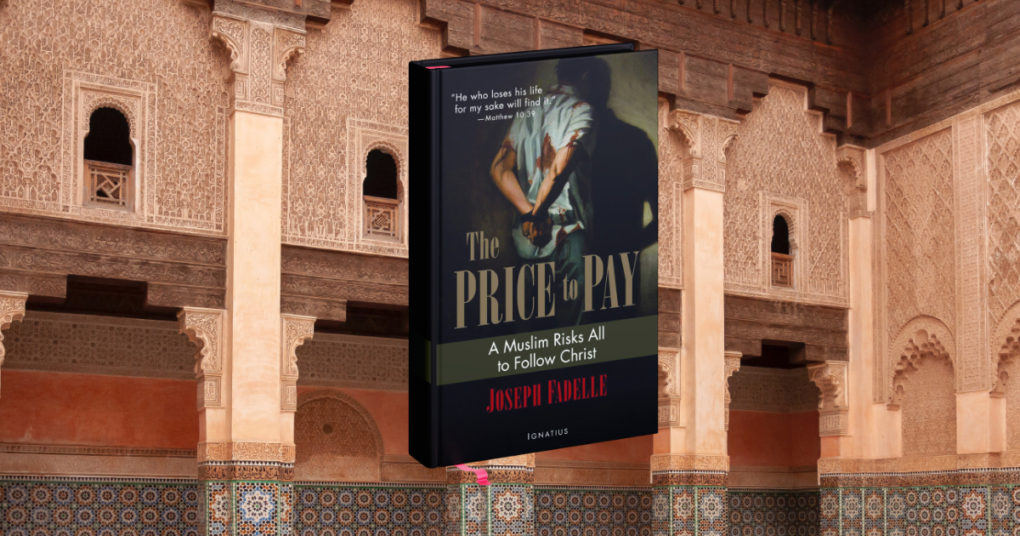The Price to Pay. A Muslim Risks All to Follow Christ
Joseph Fadelle
Ignatius Press
2015
232 pages
In the Islamic faith one is not allowed to leave and this is a crime according to its Sharia law.
This autobiography is an account of one man’s conversion from being a Muslim to becoming a Christian thus causing him immense trouble and threats to his life, not least from his immediate family. Such was his love and desire to follow Christ, however, that he endured and sacrificed much to realise this vocation and left Islam.
He begins by relating how his uncle threatened to shoot him in the presence of his four brothers in a desert valley when they discovered his conversion. He did not understand how his becoming a Christian had resulted in such hostility especially from his family. Indeed, there was a fatwa against him to kill him if he did not return to being a Muslim.
At last he ran away and heard the bullets from his own family whistle around him as he fled for his life. One of these hit his leg; he fell down – unconscious.
His vocation to follow Christ began with meeting a Christian with whom he reluctantly had to share a room with at an army base in Iraq. He had been assigned to this room but initially refused to share it with him. Christians were and are regarded as impure pariahs, as less than nothing and to be avoided at all costs. He had been told that they were, and are, heretics who worship three gods and who had a bad body odour.
Notwithstanding these prejudices, he was impressed by the man, Massoud, he met in that room and found him charming, cultivated and polite but the author was intent on converting this Christian chap to Islam. Instead the reverse happened.
In that shared room he came across a book of his roommate’s called, The Miracles of Jesus, and was intrigued by this. He had no idea that the Bible existed until Massoud told him, but rather than read the Bible he was advised to really read his own religion’s text, the Qur’an. He states that he had indeed read it but not in a way that had led to any understanding and he was embarrassed by this.
The imam had always taught him that reading the text from start to finish was more rewarded on the Muslim Day of Judgment, much more than understanding it, and that anyway it was a very complicated book to interpret. So his roommate advised him to reread it and use his intelligence for the first time.
This was something he had not done before and it threw him off-balance but he was resolved to continue to do it. He was surprised to read in the Qur’an that he should not go deeper into something that could disturb his faith but he ignored this.
Among the more disturbing aspects was its insistence that men had superiority and authority over women who were considered much less intelligent and impure, that it permitted the beating of women if necessary and that a man could demand intimate relations with a woman whenever he wished and she could not refuse.
The author, when he realised this teaching, was troubled. He further read about the prophet Muhammad and that he had married a seven year old girl and took his own daughter-in-law as his servant. He eventually became embarrassed by these findings about the prophet and thought that the verses could not have come from Allah. In short, he did not find the certitudes of the Islamic faith convincing and became depressed as these landmarks collapsed within his mind and heart.
The conversations with Massoud continued and the author learned about the Mass and the Catholic faith which he says he found bizarre. Along with this were his discoveries about the prophet and his sadness at what he calls a series of adulteries and thefts and even sanctioned assassinations.
His conversion to following Christ was quite explicit and direct and left him in no doubt that it was Jesus himself who was addressing him and calling him to follow. This call to follow was especially significant in his experience of his close family who attempted to kill him and who became some of the enemies he had to forgive.
Such discipleship is costly, as this frank and detailed account bears witness.
The author gives us a brave and bold testament to his courage in rejecting Islam and following Christ, a price he most certainly thinks well worth paying.
About the Author: James Campbell SJ
James Campbell SJ, BSc, MA(Oxon), LLM, Phd is currently the Chief Librarian and Senior Lecturer in Canon Law at Hekima University College, Nairobi. He read Philosophy, Politics and Economics at Oxford and holds an LL.M. from Cardiff Law School and a joint PhD/JCD Doctorate in Canon Law from the University of Louvain.

